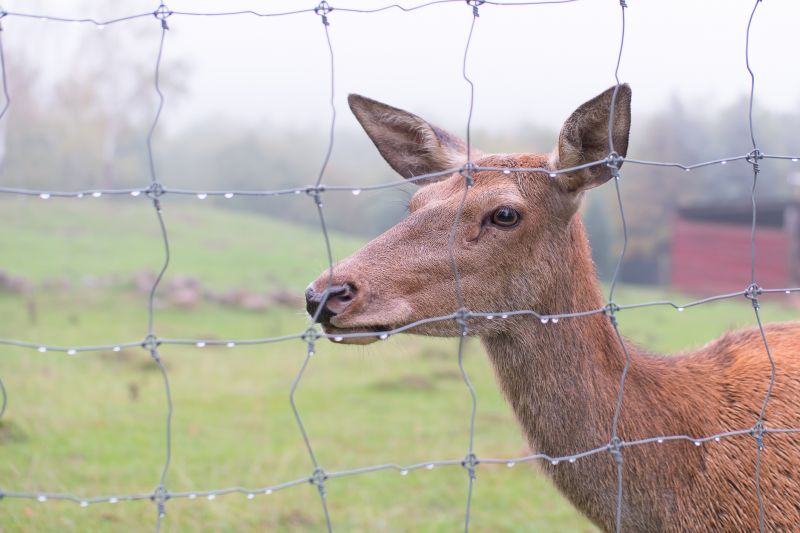Ultimate Collection Of Deer Fence Products For Effective Property Protection
Choose from a curated selection of fencing solutions that offer reliable deer deterrence and ease of installation.
 Installing a deer fence requires careful selection of the right products to ensure effective exclusion while maintaining durability and ease of installation. The foundation of a successful deer fence often begins with sturdy fencing materials that can withstand outdoor conditions and resist deer attempts to breach. Mesh panels, wire fencing, and woven wire are common options, each offering different advantages in terms of visibility, strength, and ease of setup. Proper height and tensioning are critical factors; fences typically need to be at least 8 feet tall to deter most deer, with some installations incorporating angled or overhanging sections to prevent climbing.
Installing a deer fence requires careful selection of the right products to ensure effective exclusion while maintaining durability and ease of installation. The foundation of a successful deer fence often begins with sturdy fencing materials that can withstand outdoor conditions and resist deer attempts to breach. Mesh panels, wire fencing, and woven wire are common options, each offering different advantages in terms of visibility, strength, and ease of setup. Proper height and tensioning are critical factors; fences typically need to be at least 8 feet tall to deter most deer, with some installations incorporating angled or overhanging sections to prevent climbing.
Top Overall Option
Heavy-Duty Welded Wire Mesh Fencing
This type of fencing provides a robust barrier with high tensile strength, offering reliable protection against deer. Its welded construction ensures durability and resistance to sagging or breaking, making it suitable for long-term outdoor use. Easy to install with proper posts and tensioning, it is a versatile choice for various property sizes and terrains.
Types of Products For Deer Fence Installations
Welded Wire Mesh Panels
Pre-fabricated panels made of welded wire for quick installation and reliable fencing.
Galvanized Chain Link Fencing
Durable fencing option with a classic look, resistant to rust and corrosion.
Electric Fence Wire
Conductive wire used in conjunction with energizers to provide an electric deterrent.
Polypropylene Mesh Fencing
Flexible, lightweight mesh suitable for temporary or semi-permanent fencing solutions.
Wooden Post and Wire Fencing
Traditional fencing style combining wooden posts with wire mesh or wire fencing.
Plastic Deer Fencing
Affordable, easy-to-install fencing made from durable plastic materials.
Polywire Electric Fencing
Highly visible electric fencing wire for temporary or portable barriers.
Tension Wire
Wire used to tighten and stabilize fencing panels for a secure barrier.
Corner Braces and Tension Posts
Structural components that reinforce fence corners and maintain tension.
Fence Gates and Hardware
Secure gates and hardware to allow access while maintaining barrier integrity.
Buried Mesh or Electric Barrier
Underground barriers to prevent digging under the fence.
Overhang or Angled Fence Extensions
Design features that make climbing over the fence more difficult.
Fencing Accessories
Post caps, clips, and fasteners for a complete fencing system.
Temporary Fencing Systems
Portable fencing options for seasonal or short-term use.
Expandable Modular Fencing
Fencing systems that can be expanded or reconfigured as needed.
Popular Choices
Widely used for its strength and ease of installation in various fencing projects.
A common fencing choice appreciated for its durability and visibility.
Popular for its effectiveness as an additional deterrent when combined with other fencing types.
Favored for temporary fencing needs or lightweight applications.
Essential components for functional and secure fencing setups.
Frequently used to maintain fence tension and structural integrity.
Commonly selected for their role in reinforcing fence corners and maintaining stability.
Popular for preventing deer from digging underneath the fence.
Chosen to enhance the deterrence effect against climbing.
Valued for its flexibility in adapting to property changes.
In addition to the primary fencing materials, accessories such as tension wires, corner braces, and gate hardware play vital roles in ensuring the fence remains secure over time. Installing a bottom barrier, like buried mesh or electric wire, can prevent deer from digging underneath. Electric fencing is often used as an additional deterrent, providing a mild shock that discourages deer from attempting to breach the barrier. When planning a deer fence, it is important to consider the terrain, vegetation, and local deer activity to select products that will perform reliably in your specific environment.
Maintenance is another key aspect; choosing products that are resistant to rust and corrosion can extend the lifespan of your fence. Regular inspections and timely repairs help maintain the integrity of the barrier and prevent gaps that could allow deer entry. For larger properties, modular fencing systems that can be expanded or adjusted over time offer flexibility. Overall, selecting high-quality, purpose-built products for deer fencing can help create an effective physical barrier tailored to your landscape and security needs.
Key Buying Considerations
- Fence height to ensure it is tall enough to deter deer, typically at least 8 feet.
- Material durability and resistance to rust or corrosion for long-term use.
- Ease of installation and whether the system is modular or requires professional setup.
- Type of fencing material best suited for your landscape and security needs.
- Inclusion of accessories like tension wires, corner braces, and gates for a complete system.
- Ability to incorporate electric deterrents for enhanced effectiveness.
- Bottom barrier options such as buried mesh or electric wires to prevent digging.
- Compatibility with existing landscape features and terrain considerations.
- Maintenance requirements and ease of repair over time.
- Cost-effectiveness and overall value for your specific fencing project.
- Visibility of the fence to avoid accidental damage or interference.
- Expansion options if future property modifications are anticipated.
- Local regulations or restrictions related to fencing height and materials.
- Environmental factors that could influence material choice and longevity.
- User reviews and feedback on product performance in similar settings.
This page contains affiliate links. We may earn a commission if you purchase through these links, which helps support our content creation.
